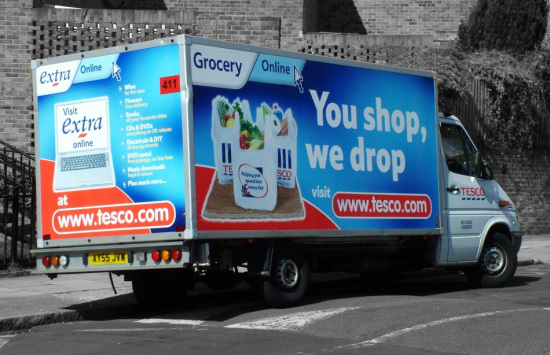Many people in the UK now choose to buy groceries online, using websites associated with large supermarket chains such as Tesco and Asda. As well as being a way of avoiding the queues and crowds at supermarkets, online shopping can actually help families budget – rather than being tempted by offers located throughout the store, the websites make it much easier to stick to the shopping list of weekly requirements.

However, those who now rely on online shopping to bring in their weekly groceries may be in for a shock soon, as the £5 standard charge for delivery may rocket in price in the coming months.
Retail experts have advised consumers that supermarkets would have to charge up to £15 for each delivery in order to make the process economical for the businesses involved. The cost of collecting, bagging and delivering items is actually nearer to £20 for each order, meaning that supermarkets are forced to make in-store shoppers subsidise the cost of online shopping by charging more for products.
Head of research at Shore Capital Stockbrokers, Dr Clive Black, claims that free delivery or charges of up to £6.50 currently in place are unsustainable, with the only solution being supermarkets charging more for door to door delivery of items.
He says; “Supermarket online grocery is more of a service than a profit generator due to the cost of fulfilment.
“Online grocery without proper charging for distribution is not a sustainable model. In the long run, the service cost of home delivery will need to be better covered if this growing channel is not going to deplete returns and penalise the poor.
“More grocery orders online may make it more economic to fulfil them, but charges of around £10 to £15 would be more cost covering than the present system which runs from free delivery to £6.50.”
In the past few years, online grocery shopping has gone from strength to strength, with many supermarket chains reporting a growing interest by consumers in the online legs of their operations. For example, Waitrose this week posted a 50 per cent increase in the number of consumers choosing to do their weekly shop from the comfort of their own homes.
Currently, one in twenty weekly shops take place online, with the rate of sales made via online shopping growing at an average of 15 per cent every year.
Satellite navigation company Trimble believes that it may have discovered the reason so many shoppers are abandoning commercial properties in favour of having their groceries delivered to their doors. In a survey, they found that households now pay an average of £136 to have shopping delivered to their house every year. They believe that ever increasing petrol prices and the high cost of parking a car in many town centre car parks are playing a large part in the recent boom for internet shopping.
The survey also found that people are growing more willing to pay these delivery charges as an alternative to having to traipse around supermarkets acquiring groceries themselves.
Do you rely on internet shopping to bring in your weekly food shop, or do you prefer the physical experience of visiting the supermarket? If you are one of the one in twenty households that now buys groceries via the internet, would an increase in delivery costs dissuade you from using the online service?